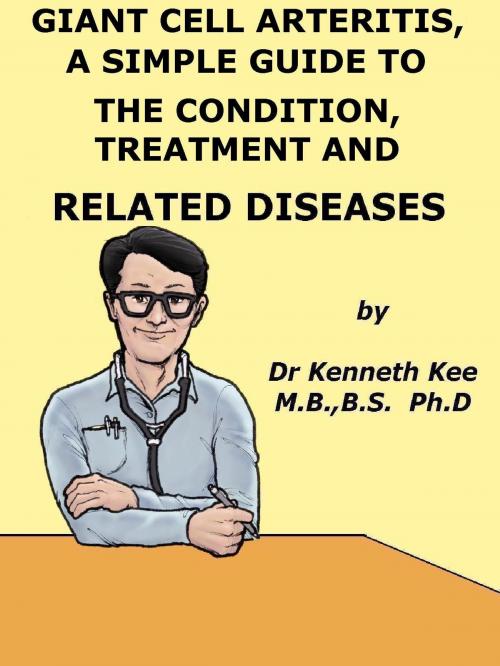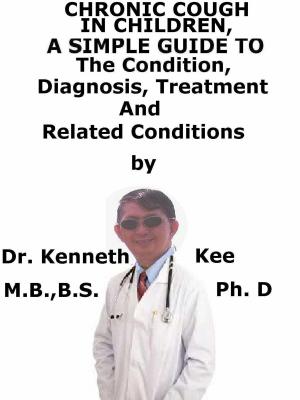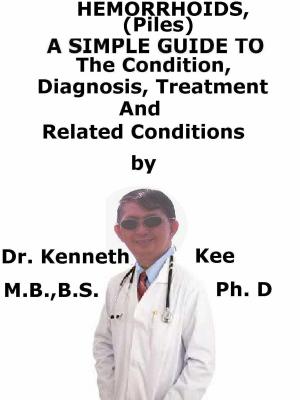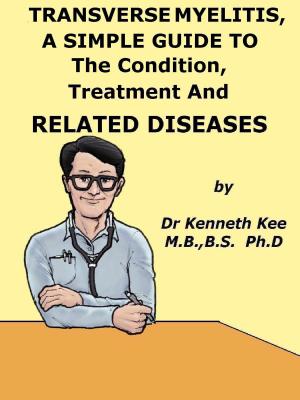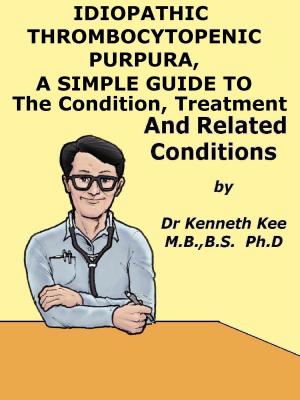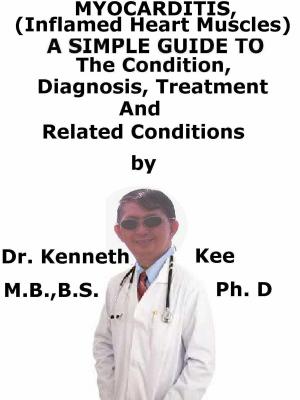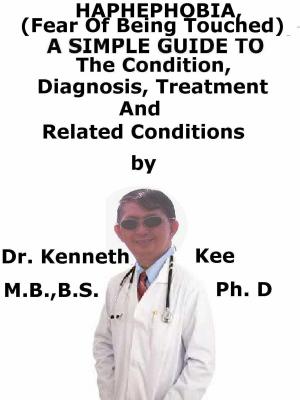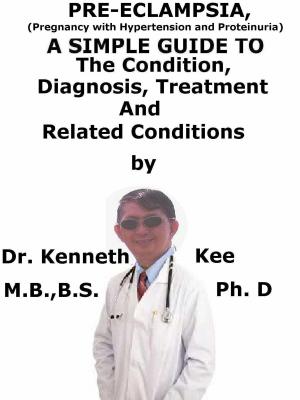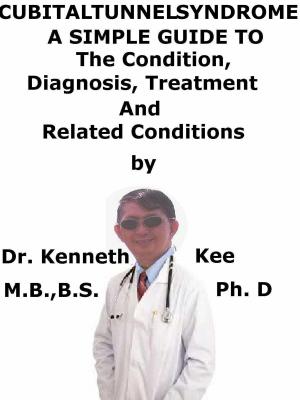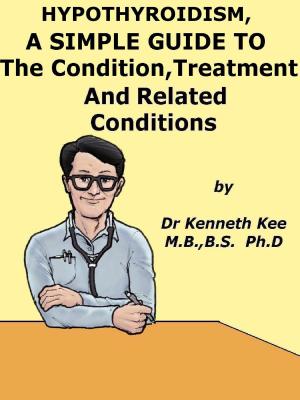Giant Cell Arteritis, A Simple Guide To The Condition, Treatment And Related Diseases
Nonfiction, Health & Well Being, Health, Ailments & Diseases, Immune System, Medical, Specialties, Internal Medicine, Neurology| Author: | Kenneth Kee | ISBN: | 9781310956560 |
| Publisher: | Kenneth Kee | Publication: | December 18, 2014 |
| Imprint: | Smashwords Edition | Language: | English |
| Author: | Kenneth Kee |
| ISBN: | 9781310956560 |
| Publisher: | Kenneth Kee |
| Publication: | December 18, 2014 |
| Imprint: | Smashwords Edition |
| Language: | English |
Giant Cell Arteritis is an inflammatory syndrome of cranial arteries
It causes reddening and tenderness around the temporal arteries of the body.
It may be part of the polymyalgia rheumatica syndrome
It can also affect the nerves and give rise to the skin symptom
Symptoms often include fever, a general feeling of malaise
The most common symptom is the one sided or bilateral headache
Giant Cell Arteritis can cause visual impairment and blindness.
Physical examination show presence of jaw claudication and tenderness
GCA is diagnosed with a raised ESR and CRP and evidence of vasculitis
Polymyalgia rheumatica is also associated with Giant cell arteritis
Diagnosis of GCA is the presence of abnormal giant cells in temporal artery biopsy
Treatment is usually with corticosteroids or immunosuppressant therapy
-An original poem by Kenneth Kee
Interesting Tips about the Giant Cell Arteritis
A Healthy Lifestyle
-
Take a well Balanced Diet
-
Prompt medical action is important as untreated temporal arteritis can progress to the ophthalmic artery which supplies blood to the retina of the eye.
a. High dose corticosteroids prednisolone by mouth daily.
b. Dosage of corticosteroids can be reduced 2-3 weeks after symptoms disappear
c. Maintenance dose of corticosteroids should be continues for six to eight months
Headache is a fairly common complaint in any family doctor clinic.
It is important to treat for nausea, vomiting, stiffness of the neck, fits, stress, lack of sleep, flashes of light in the eyes, and weakness of one side of the body.
The doctor should always treat for any high fever (one of the common causes) and high blood pressure.
Prognosis is good with prompt onset of corticosteroids treatment before loss of vision
Loss of vision is irreversible once it occurred
- Keep bones and body strong
Bone marrow produces our blood
Eat foods rich in calcium like yogurt, cheese, milk, and dark green vegetables.
Eat foods rich in Vitamin D, like eggs, fatty fish, cereal, and fortified milk.
Eat food rich in Vitamins B and C such as green vegetables and fruits
Zinc and other minerals are important to the body
- Get enough rest and Sleep
Avoid stress and tension
- Exercise and stay active.
It is best to do weight-bearing exercise such as walking, jogging, stair climbing, dancing, or lifting weights for 2½ hours a week.
One way to do this is to be active 30 minutes a day at least 5 days a week.
Begin slowly especially if a person has not been active.
- Do not drink more than 2 alcohol drinks a day for a man or 1 alcohol drink a day for a woman.
Alcohol use also increases the chance of falling and breaking a bone.
Alcohol can affect the neurons and brain cells.
- Stop or do not begin smoking.
It also interferes with blood supply and healing.
Chapter 1
Giant Cell Arteritis
What is Giant Cell Arteritis?
Giant Cell Arteritis or Temporal Arteritis is an inflammatory syndrome of cranial arteries especially the temporal artery.
It causes reddening and tenderness around the blood vessels or a dull ache on the temporal sides of the head.
It may be associated with blindness and may be part of the polymyalgia rheumatica syndrome.
It usually affects middle aged or older people.
It is rare under the age of 50 years.
Women are more affected than men.
There is inflammation of all layers of medium sized arteries within the carotid distribution occasionally elsewhere.
TABLE OF CONTENT
Introduction
Chapter 1 Giant Cell Arteritis
Chapter 2 More Facts about Giant Cell Arteritis
Chapter 3 Treatment of Giant Cell Arteritis
Chapter 4 Vasculitis
Chapter 5 Polymyalgia Rheumatica
Chapter 6 Kawasaki Disease
Chapter 7 Migraine
Giant Cell Arteritis is an inflammatory syndrome of cranial arteries
It causes reddening and tenderness around the temporal arteries of the body.
It may be part of the polymyalgia rheumatica syndrome
It can also affect the nerves and give rise to the skin symptom
Symptoms often include fever, a general feeling of malaise
The most common symptom is the one sided or bilateral headache
Giant Cell Arteritis can cause visual impairment and blindness.
Physical examination show presence of jaw claudication and tenderness
GCA is diagnosed with a raised ESR and CRP and evidence of vasculitis
Polymyalgia rheumatica is also associated with Giant cell arteritis
Diagnosis of GCA is the presence of abnormal giant cells in temporal artery biopsy
Treatment is usually with corticosteroids or immunosuppressant therapy
-An original poem by Kenneth Kee
Interesting Tips about the Giant Cell Arteritis
A Healthy Lifestyle
-
Take a well Balanced Diet
-
Prompt medical action is important as untreated temporal arteritis can progress to the ophthalmic artery which supplies blood to the retina of the eye.
a. High dose corticosteroids prednisolone by mouth daily.
b. Dosage of corticosteroids can be reduced 2-3 weeks after symptoms disappear
c. Maintenance dose of corticosteroids should be continues for six to eight months
Headache is a fairly common complaint in any family doctor clinic.
It is important to treat for nausea, vomiting, stiffness of the neck, fits, stress, lack of sleep, flashes of light in the eyes, and weakness of one side of the body.
The doctor should always treat for any high fever (one of the common causes) and high blood pressure.
Prognosis is good with prompt onset of corticosteroids treatment before loss of vision
Loss of vision is irreversible once it occurred
- Keep bones and body strong
Bone marrow produces our blood
Eat foods rich in calcium like yogurt, cheese, milk, and dark green vegetables.
Eat foods rich in Vitamin D, like eggs, fatty fish, cereal, and fortified milk.
Eat food rich in Vitamins B and C such as green vegetables and fruits
Zinc and other minerals are important to the body
- Get enough rest and Sleep
Avoid stress and tension
- Exercise and stay active.
It is best to do weight-bearing exercise such as walking, jogging, stair climbing, dancing, or lifting weights for 2½ hours a week.
One way to do this is to be active 30 minutes a day at least 5 days a week.
Begin slowly especially if a person has not been active.
- Do not drink more than 2 alcohol drinks a day for a man or 1 alcohol drink a day for a woman.
Alcohol use also increases the chance of falling and breaking a bone.
Alcohol can affect the neurons and brain cells.
- Stop or do not begin smoking.
It also interferes with blood supply and healing.
Chapter 1
Giant Cell Arteritis
What is Giant Cell Arteritis?
Giant Cell Arteritis or Temporal Arteritis is an inflammatory syndrome of cranial arteries especially the temporal artery.
It causes reddening and tenderness around the blood vessels or a dull ache on the temporal sides of the head.
It may be associated with blindness and may be part of the polymyalgia rheumatica syndrome.
It usually affects middle aged or older people.
It is rare under the age of 50 years.
Women are more affected than men.
There is inflammation of all layers of medium sized arteries within the carotid distribution occasionally elsewhere.
TABLE OF CONTENT
Introduction
Chapter 1 Giant Cell Arteritis
Chapter 2 More Facts about Giant Cell Arteritis
Chapter 3 Treatment of Giant Cell Arteritis
Chapter 4 Vasculitis
Chapter 5 Polymyalgia Rheumatica
Chapter 6 Kawasaki Disease
Chapter 7 Migraine
